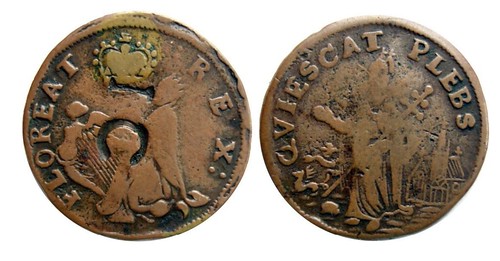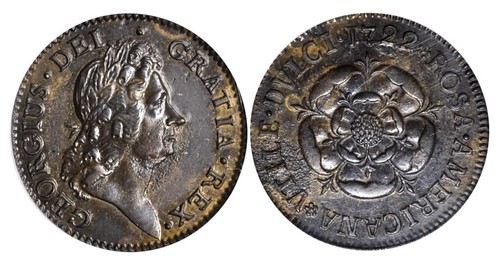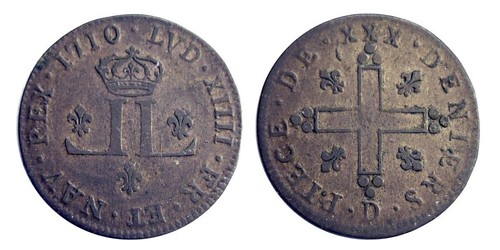
PREV ARTICLE
NEXT ARTICLE
FULL ISSUE
PREV FULL ISSUE
V25 2022 INDEX E-SYLUM ARCHIVE ROSA AMERICANA FIXED PRICE LIST #23 SELECTIONSHere are a few items that caught my eye in Jeff Rock's Rosa Americana Colonial Coins fixed price list #23. To get your copy, contact Jeff at rosaamltd@gmail.com. -Editor 2. Undated (ca. 1652-1674) St. Patrick Farthing. Martin 1b.6-Ca.10, W-11500. Low Rarity-7. Copper. Nothing Below King. Choice Very Fine, a well struck and pleasing example of this VERY RARE variety, rated a Low Rarity-7 in Syd Martin's book on the series. The obverse has been boldly counterstamped IC in individual letter punches, and thus may be traceable to a silversmith, pewter maker, or someone in a similar occupation. The coin itself is quite nice, the legends full and bold on either side, the design details strong save for St. Patrick's face which is directly opposite the I of the countermark and was slightly weakened by it. There is a bold golden splash at the crown, and the planchet is a pleasing light tan, with surfaces that are mostly hard and very pleasing to the eye. A very rare variety, we have only been able to locate three auction records, including this exact coin which was in Stack's Bowers November 2019 C4 auction. In that sale the cataloguer noted that
For many years I collected U.S. Merchant Counterstamps by the undertype - assembling an interesting type coin collection. I didn't have many counterstamped colonials, and this would have made a fine addition to that group. -Editor 4. 1722 Rosa Americana Penny. Martin 2-A.1, W-1256, the VTILE DVLCI reverse. Rarity-6. ICG graded EF45, an accurate grade in our opinion. This example appeared as Lot 5015 in the Stack's Bowers 2016 C4 sale, where it was ably catalogued as follows:
1722 Rosa Americana Penny. Martin 2.1-A.1, W-1256. Rarity-5. VTILE DVLCI. EF-45
(ICG). 118.9 grains. This sharply struck Rosa Americana penny offers crisp detail to both the
obverse portrait and the reverse rose. It is boldly toned in a blend of deep steely-copper and
lighter antique gold. Areas of porosity are evident on the obverse at King George's face and on
the reverse around the word VTILE, but otherwise this piece appears fairly smooth. As a rule,
not an exception, bath metal coins show some porosity -- a characteristic of the metal itself. This
is a scarce Guide Book variety with Vs in place of Us in the reverse legend.
Provenance: From the Carolina Colonial Coin Collection. Earlier from our (Stack's) sale of the
John L. Roper, 2nd Collection of Colonial & Early American Coins, December 1983, lot 81; our
(Bowers and Merena's) Montgomery Collection sale, May 1998, lot 66. Bowers and Merena lot
tag included.
The Roper collection is rightly famous for the quality of the coins it contained, and the excellent job of cataloguing, one of the indispensable sales in a colonial library – though it was sold at the absolute low point of the coin market so the prices realized list looks more like wishful thinking today! Those coins were quickly absorbed into some of the finest collections, and few have reentered the marketplace. This rare type, the only obverse die to have V's in the legend instead of U's, is always popular – we note that a VF20 sold in the 2012 C4 sale for $3,220. This example, 25 points higher and with a provenance to one of the key collections of the modern era is a bargain at just..........$1,400 Beautiful piece! -Editor 14. 1710-D [Lyon Min] French Colonies 30 Deniers. Vlack-2, W-11710. Rarity-2 About Uncirculated, very nearly in the Choice category. Light rub on the high points of either side, but with a fair amount of luster under the gunmetal gray toning. Boldly struck, with all the legends and design details as crisp as when the coin dropped from the dies. There is a crescent shaped diebreak below the first X of the denomination on the reverse, but no real marks from actual circulation. This is a rare issue to find in high grades as they were intended to circulate, not sit in collector's cabinets. Struck on new planchets and with new designs, these were soon named mousquetaires due to the resemblance of the cross design on the reverse to the emblem of the royal musketeers. Struck at only two mints, Lyon and Metz, from 1709-1713 only. and in just two denominations of 15 and 30 deniers, this was the first billon issue struck specifically for France's North American colonies. They were over-valued in terms of metal content, only slightly heavier than the Recoined Sols which were valued at only 15 deniers, half the value of the new coin. This was purposely done, to insure that most stayed in North America and other French colonies, since no French merchant would accept them back at that valuation. Bob Vlack estimates that this coinage stayed in circulation for at least a century, and given the average grade of most survivors today this is not unreasonable; Vlack notes some of the fluctuations in valuation of this coin, which soared to 36 deniers at the height of the Mississippi Bubble speculations in 1720 – at this valuations, much of the original mintage likely returned to France for melting. By the time the Sous Marques billon coinage started in 1738 these earlier 30 deniers had fallen to just 18 deniers, essentially the value of their metal at that point. Listed in both the Whitman Encyclopedia and the Redbook, this is a French Colonies type that every colonial collection should include! This very pleasing AU specimen is priced well under the Redbook valuation for an average AU at only.........$400 Great example of an important piece of American numismatic history. -Editor
To read the earlier E-Sylum article, see:
THE BOOK BAZARREWayne Homren, Editor The Numismatic Bibliomania Society is a non-profit organization promoting numismatic literature. See our web site at coinbooks.org. To submit items for publication in The E-Sylum, write to the Editor at this address: whomren@gmail.com To subscribe go to: https://my.binhost.com/lists/listinfo/esylum All Rights Reserved. NBS Home Page Contact the NBS webmaster 
|


